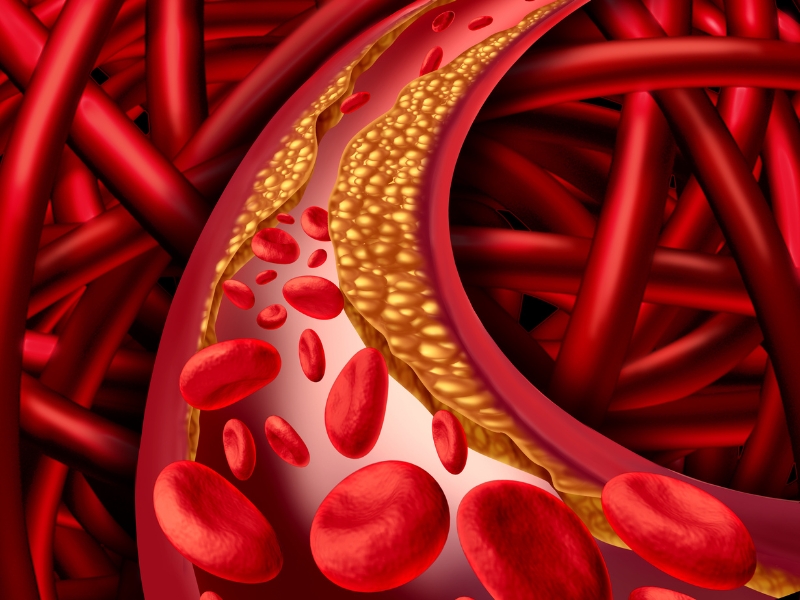
Elevated total cholesterol levels and/or elevated low-density lipoprotein (LDL) cholesterol levels are associated with increased risk of coronary artery disease, which is the most common form of heart disease. Now, a meta-analysis shows that CoQ10 supplementation significantly improves total cholesterol and HDL-cholesterol in coronary artery disease patients.
Coenzyme Q10 adjuvant treatment of heart failure patients significantly improves the symptoms and survival of chronic heart failure patients [Mortensen; Morisco; Munkholm].
How does it look with Coenzyme Q10 supplementation and coronary artery disease?
Coronary artery disease is caused by hardening and narrowing of the coronary arteries that bring blood to the heart muscle? Coronary artery disease is also known as ischemic heart disease, which is heart disease characterized by reduced flow of blood containing oxygen to the heart muscle.
Atherosclerosis is the medical term for the form of heart disease that is caused by damage to the inner layer of arteries. High amounts of cholesterol in the blood are thought to contribute to the build-up of plaque, which causes the arteries to harden and narrow. If, then, pieces of plaque break open, blood platelets stick to the ruptured area and form blood clots, which narrow the arteries even more, restricting the blood flow even more. The result can be coronary artery disease or heart attack or stroke.
A recent meta-analysis of eight clinical studies shows that CoQ10 supplementation significantly decreased total cholesterol and significantly increased HDL-cholesterol levels in patients with coronary artery disease [Jorat].
CoQ10 supplementation and coronary artery disease
The researchers doing this meta-analysis selected eight clinical studies (with 267 participants in the intervention groups and 259 in the placebo groups) for analysis [Jorat].
- Seven clinical trials had a double-blind design; one of the trials was single-blind. Seven trials used parallel design, and one used cross-over design.
- The duration of the intervention in the eight trials ranged from 4 to 48 weeks.
As indicated above, the combined results from the eight studies show significant improvements in total cholesterol and in HDL-cholesterol, arguably the most important components of the patients’ lipid profiles [Jorat].
The results did not show significant improvements, however, in triglyceride levels, LDL-cholesterol levels, and lipoprotein a levels in the coronary artery disease patients [Jorat].
The authors of the meta-analysis explain that there were differences in the study design, the study participants’ characteristics, the dosage of the CoQ10 supplementation, and the duration of intervention in the eight analyzed studies [Jorat].
How does CoQ10 supplementation help in coronary artery disease?
The evidence from the meta-analysis indicates that Coenzyme Q10 supplementation is significantly associated with improvements in total cholesterol and HDL-cholesterol, which are implicated as factors in the development of atherosclerosis, the hardening of the arteries.
Moreover, elevated total cholesterol and elevated LDL-cholesterol and low HDL-cholesterol levels are associated with the following troubling developments:
- impaired mitochondrial function
- increased production of harmful free radicals and reactive oxygen species
- chronic inflammation and endothelial dysfunction
Coenzyme Q10 is a fat-soluble intracellular antioxidant
Coenzyme Q10 is an intracellular fat-soluble antioxidant that quenches harmful free radicals and attenuates the dysfunction that is caused by oxidative stress and inflammation [Jorat].
A second meta-analysis of 13 clinical studies conducted by Dr. Jorat and his colleagues showed that Coenzyme Q10 supplementation was associated with significantly increased levels of the antioxidant enzymes superoxide dismutase and catalase [Jorat]. Superoxide dismutase and catalase are important components of the body’s endogenous defense against cell damage caused by harmful free radicals.
Coenzyme Q10 supplementation in these 13 studies was also associated with significantly reduced levels of malondialdehyde, a reliable bio-marker for oxidative stress. The Coenzyme Q10 supplementation was also associated with reduced levels of conjugated dienes, which can act as toxic tissue messengers [Jorat].
In a 2013 Taiwanese study, Coenzyme Q10 supplementation of coronary artery disease patients with at least 50% stenosis of at least one major coronary artery was associated with significantly increased levels of the endogenous antioxidant enzymes superoxide dismutase and catalase and with significantly reduced levels of bio-markers for inflammation [Lee].

Dr. William V. Judy, president of the SIBR Research Institute, has noted that low blood and tissue levels of Coenzyme Q10 are associated with heart failure and can be improved with oral Coenzyme Q10 supplementation. Similarly, he thinks that CoQ10 supplementation can improve cellular bio-energetic and antioxidant activity in coronary artery disease patients. In addition, Dr. Judy’s research has shown that Coenzyme Q10 supplementation before and after heart surgery improves postoperative recovery.
Coenzyme Q10 supplementation during ageing and statin use
Coenzyme Q10 supplementation seems especially to be indicated for two conditions:
- Ageing: as we grow older – beyond our 20s – we bio-synthesize less and less CoQ10 with increasing age. It is impossible to make up the loss by eating more food [Kalén; Judy].
- Using statin medications: statin medications inhibit the body’s production of Coenzyme Q10 just as surely as they inhibit the body’s production of cholesterol. Supplementation is the only known way to make up for the loss of endogenous CoQ10 [Okuyama]
Coenzyme Q10 supplementation and important clinical trial outcomes
Chronic heart failure: the results of the Q-Symbio study showed significant improvements in the symptoms and survival of chronic heart failure patients [Mortensen]
Gulf War Illness: the results of the Gulf War Illness study showed significant improvement in physical function and improvement in 19 of 20 symptoms tested [Golomb].
Senior citizens: the results of the KiSel-10 study showed reduced risk of better mortality, better heart function, lower bio-marker levels of oxidative stress, inflammation, and cardiac fibrosis, and increased levels of insulin-like growth factor 1 [Alehagen].
Coenzyme Q10 and oxidative stress reduction
The authors of the meta-analysis conclude that CoQ10 supplementation can CoQ10 can reduce total cholesterol, promote HDL-cholesterol production, suppress inflammation, and reduce levels of malondialdehyde, a known bio-marker for oxidative stress [Jorat].
Read our key article about CoQ10 and cardiovascular health in elderly people
Read our key article on CoQ10 as adjuvant therapy for heart failure
Sources
Alehagen, U., Johansson, P., Björnstedt, M., Rosén, A., & Dahlström, U. (2013). Cardiovascular mortality and N-terminal-proBNP reduced after combined selenium and coenzyme Q10 supplementation: a 5-year prospective randomized double-blind placebo-controlled trial among elderly Swedish citizens. International Journal of Cardiology, 167(5), 1860-1866.
Alehagen, U., Aaseth, J., Alexander, J., & Johansson, P. (2018). Still reduced cardiovascular mortality 12 years after supplementation with selenium and coenzyme Q10 for four years: A validation of previous 10-year follow-up results of a prospective randomized double-blind placebo-controlled trial in elderly. Plos One, 13(4), e0193120. doi:10.1371/journal.pone.0193120
Golomb, B. CoQ10 and gulf war illness. Neural Computation 2014 Nov; Vol. 26 (11), pp. 2594-651.
Jorat, M. V., Tabrizi, R., Mirhosseini, N., Lankarani, K. B., Akbari, M., Heydari, S. T., & Asemi, Z. (2018). The effects of coenzyme Q10 supplementation on lipid profiles among patients with coronary artery disease: a systematic review and meta-analysis of randomized controlled trials. Lipids in Health and Disease, 17(1), 230.
Jorat, M. V., Tabrizi, R., Kolahdooz, F., Akbari, M., Salami, M., Heydari, S. T., & Asemi, Z. (2019). The effects of coenzyme Q10 supplementation on biomarkers of inflammation and oxidative stress in among coronary artery disease: a systematic review and meta-analysis of randomized controlled trials. Inflammopharmacology. https://doi-org.db14.linccweb.org/10.1007/s10787-019-00572-x
Judy, W. V. (2018). Private communication.
Kalén, A., Appelkvist E.L., Dallner G. (1989). Age-related changes in the lipid compositions of rat and human tissues. Lipids, 24(7):579–584.
Lee, B.-J., Tseng, Y.-F., Yen, C.-H., & Lin, P.-T. (2013). Effects of coenzyme Q10 supplementation (300 mg/day) on antioxidation and anti-inflammation in coronary artery disease patients during statins therapy: a randomized, placebo-controlled trial. Nutrition Journal, 12(1), 142.
Morisco, C., Trimarco, B., & Condorelli, M. (1993). Effect of coenzyme Q10 therapy in patients with congestive heart failure: a long-term multicenter randomized study. The Clinical Investigator, 71(8 Suppl), S134-S136.
Mortensen, S. A., Rosenfeldt, F., Kumar, A., Dolliner, P., Filipiak, K. J., Pella, D., & Littarru, G. P. (2014). The effect of coenzyme Q10 on morbidity and mortality in chronic heart failure: results from Q-SYMBIO: a randomized double-blind trial. JACC. Heart Failure, 2(6), 641-649.
Munkholm, H., Hansen, H. H., & Rasmussen, K. (1999). Coenzyme Q10 treatment in serious heart failure. Biofactors (Oxford, England), 9(2-4), 285-289.
Okuyama, H., Langsjoen, P. H., Hamazaki, T., Ogushi, Y., Hama, R., Kobayashi, T., & Uchino, H. (2015). Statins stimulate atherosclerosis and heart failure: pharmacological mechanisms. Expert Review of Clinical Pharmacology, 8(2), 189-199.
The information presented in this review article is not intended as medical advice and should not be used as such.









Leave A Comment